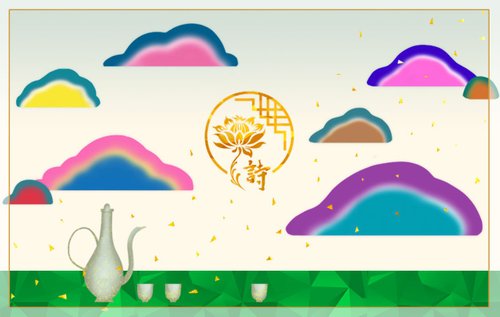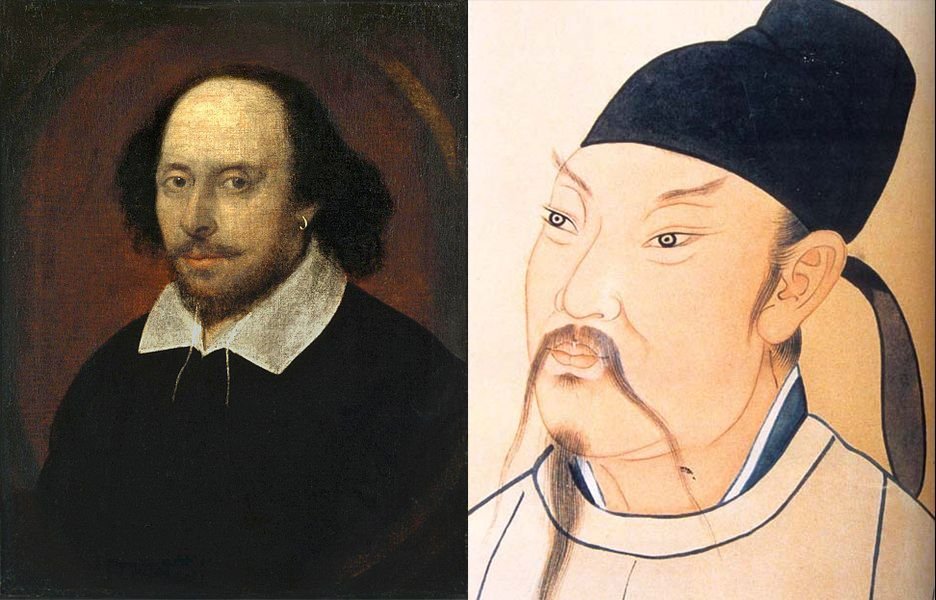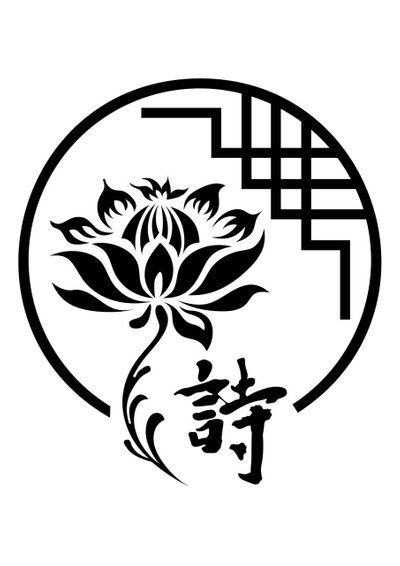
“Shall I compare thee to a summer’s day?” is the first line of Shakespeare’s Sonnet 18. Sonnet 18 is one of his most famous Sonnet, and even if you have never studied Shakespeare’s works in detail, you would probably be aware of his famous fourteen line sonnets.
“Shall I compare thee to a summer’s day?” 這是大文豪莎士比亞的十四行詩第十八首的第一句,莎士比亞除了劇作,他的十四行詩也是名垂千古,我相信你就算未讀過也會知道十四行詩。
In the Chinese poetry world, “Bright moonlight before my bed, I suppose it is frost on the ground” (床前明月光,疑是地上霜) is the opening of the famous poem Quiet Night Thoughts 《靜夜思》 by the one of the greatest Chinese poets Li Bai 李白. It is often recited as a nursery rhyme and many Chinese children grew up listening to this poem. In the English speaking world, most people would probably have never heard of the Quiet Night Thoughts or even Li Bai.
「床前明月光,疑是地上霜」,這是中國詩仙李白最著名詩作《靜夜思》的第一句,在華人社會,我相信就是三歲小兒都懂得《靜夜思》,但如果你跟一名外國人談及《靜夜思》,不要說詩句,他應該連李白是誰都不知道。

A lot of people will recognise Shakespeare, but not even many Chinese may recognise Li Bai 很多人都會認得圖左的畫像就是莎士比亞,但我相信很多華人都未必認得圖右的就是中國詩仙李白。
(圖片來源:維基百科)
Poetry has existed for thousands of years, from Homer to Dante, from Shakespeare to Tagore, all these poems have stood the test of time. Chinese poetry also has a long history extending back to as early as the Western Zhou dynasty in BC771. Over the years, it has evolved throughout the centuries, each dynasty making their mark on its way. However, in recent years people seems to be more interested in contemporary poetry, with classical poetry have gradually fallen out of fashion. That is why we have started the Chinese Culture Project.
詩歌發展數千年,由荷馬到但丁,由莎士比亞到泰戈爾,一首又一首的詩歌流傳至今,中國同為詩詞大國,早於西周已有詩經,再歷楚辭、樂府、唐詩、宋詞、元曲,每代百花齊放,但歷經現代文化衝擊,我們的新一代紛紛轉向現代詩歌,寫新詩,讀新詞,卻像遺忘了中國古詩詞的繁盛。因此,我們組成了這個組合 – 樂筆詩塾。
The Chinese Culture Project is created by a group of Steemians from Hong Kong who have a passion for Chinese culture. We’re not a group of scholars nor do we have a strong foundation in literature. What we want to do is to promote Chinese classical poetry far afield beyond the Chinese speaking community. We hope to introduce it to more people and that Chinese poetry will gain more recognition worldwide.
樂筆詩塾由一群喜歡中國文化的香港朋友組成,我們沒有淵博的學識,沒有深厚的文學根底,但我們希望將中國古代詩詞推廣出去,讓世界更多朋友能夠認識中國古詩詞,欣賞中國古詩詞。
The Chinese has a saying 「樂不思蜀」 which means one is enjoying themself so much that they forget to go home. Our Chinese project name 「樂筆詩塾」 is a play on words for this saying . 「樂」means happiness or music and in this case we take it to mean music. 「不」 is the negative form in Chinese and in Cantonese sounds the same as pen「筆」something that is essential to write poetry. 「思」means think and sounds the same as 「詩」which is poem or poetry. And finally 「蜀」is the alternative name for Sichuan Province, this is where the author of the saying hails from. It sounds the same「塾」which is what private schools used to be called in the old days. And there we have our Chinese project name, we hope you will enjoy is so much that you don’t think about leaving.
我們的名稱是樂筆詩塾,「樂」是音樂的樂,「筆」是毛筆的筆,「私塾」就是中國古代學堂之稱,而我們是詩的學堂,自然就是「詩塾」。由於粵語的「筆」跟「不」同音,所以我們就借了「樂不思蜀」一詞,命名為「樂筆詩塾」。

Our project logo has a lotus flower and the chinese word ‘poem’ inside a Chinese style window frame. Traditionally the lotus flower is regarded as pure, clean and elegant and has always been a favourite topic in classical Chinese poetry. The entire logo represents our respect to Chinese poetry and culture.
我們的Logo以一朵荷花及一個「詩」字組成。荷花在中國傳統文化素有聖潔高雅的象徵,是中國詩歌的熱門主題,正代表了我們對中國詩歌的尊敬與歌頌。而「詩」字則不需多加解釋了,一個以「詩」入題的計劃,「詩」字就是最好的詮釋,再配以線條勾繪成的中國式屏風,展現出中國的傳統文化特色
The aim of our project is pretty simple. We’re not here to analyse the meaning and structure of the poems in a scholarly manner because we don’t have the ability to do that. What we aim to do is to introduce Chinese poems to the English speaking world in a simple and contemporary way, so you can have a basic understanding and appreciation of it, and hopefully arouse your interest to learn more.
我們所做的事情很簡單,我們不會像學者一般,很仔細的分析每一首詩詞,我們亦做不到。我們希望以更多不同的現代形式,向外國的朋友介紹詩詞,包括音樂、圖畫、故事等,以一個淺白的方法,讓不懂中國詩詞的外國朋友,也能夠對中國詩詞有初步及基本的了解,從而喜歡中國詩詞。
Initially, we will focus on poems from the Tang Dynasty, and will introduce one each week. We will compose our own music, draw our own sketches, translate classical Chinese into modern day Chinese and use story telling to explain the poem. Finally, we will translate that into English and share it with the English speaking world. Our team consists of @kona (music), @nanosesame (art), @perlia (literature translation), @aaronli (promotion and Chinese editor) and @livinguktaiwan (English editor). Since the team lives in different places, all our work and collaboration is done entirely online, but we hope one day the Chinese Culture Project team can do a meetup. In the meanwhile, here’s our group photo.
在計劃的初期,我們將以「唐詩」為第一步,暫定每星期介紹一首唐詩,為該詩配樂、畫圖,再用說故事的方法,將詩詞的意思、含義及優美介紹給外國的朋友。我們的團隊如下:@kona (音樂)、@perlia (文學)、@livinguktaiwan (英語翻譯)、@nanosesame (美術) 及 @aaronli (中文部分及推廣)。由於我們居住在不同的地方,故現時的工作及討論全都在線上完成,期待未來一天「樂筆詩墪」的成員能聚首一堂,給大家一張合照!

We don’t know how successful our project will be. We don’t know if you guys will like what what we’re doing and want to learn more about Chinese literature, and we certainly don’t know how long we can persevere. What we do know, is that if we don’t try, we’ll never find out.
我們不知道計劃能否成功,也不知道能否透過這形式推廣中國詩詞,讓外國朋友認識及喜愛中國詩詞,我們也不知道我們能否堅持多久,但我們知道一點:如果不嘗試,我們什麼都做不到。
We will be introducing the first Tang poem very soon. Once it’s out we hope you will like our work and support the Chinese Culture Project. In the meanwhile, we’d love for you to give us some comments and feedback so we can make sure we can do our best!
介紹完畢!我們將很快推出第一首唐詩的介紹,希望你們會喜歡及支持樂筆詩塾,亦希望大家能夠多給意見,讓我們能做得更好!

